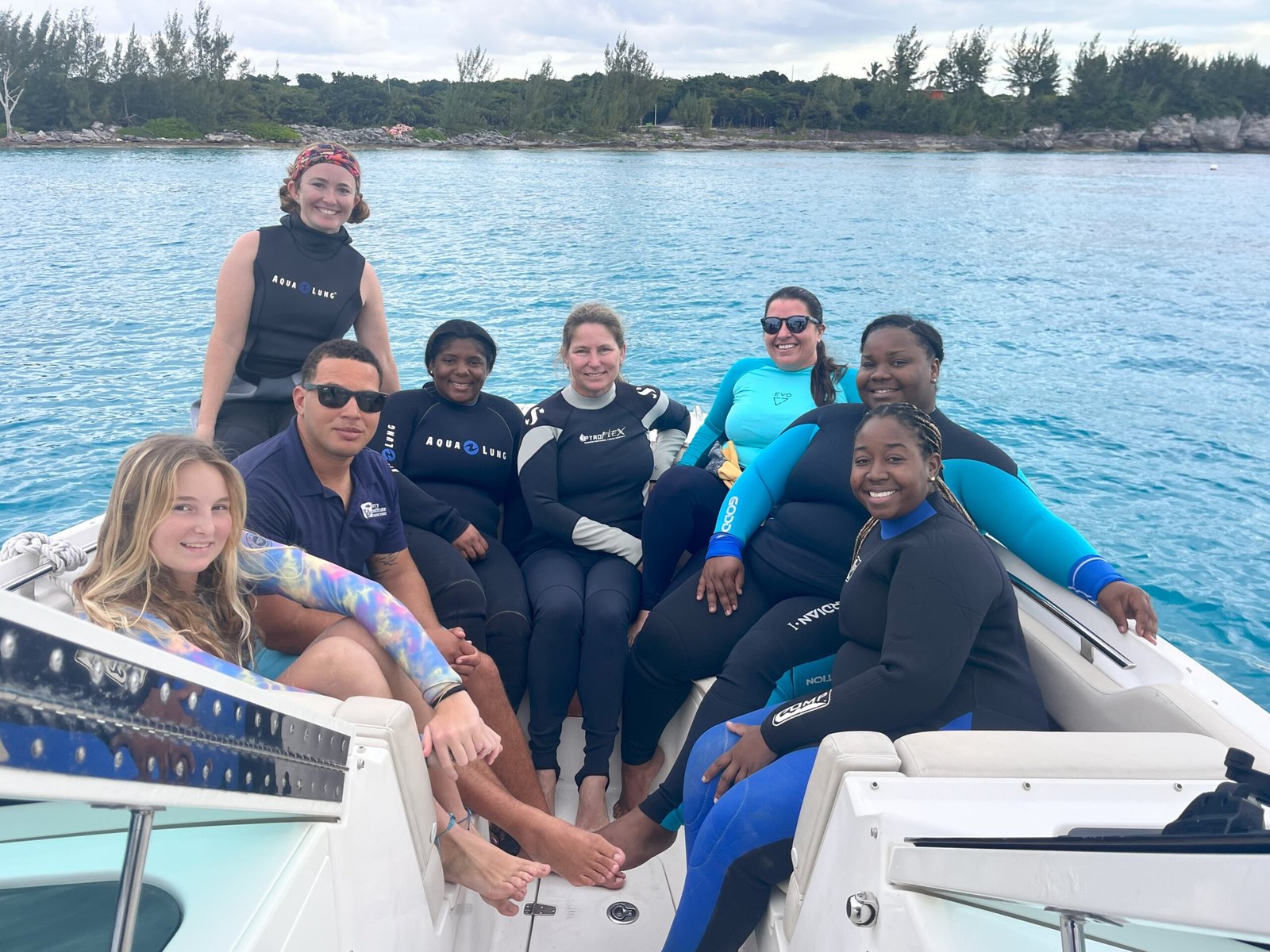NASSAU, BAHAMAS — The Bahamas Reef Environment Educational Foundation (BREEF), in partnership with the Perry Institute for Marine Science (PIMS) ‘Reef Rescue Network’ (RRN) recently completed a two-day coral nursery cleaning and outplanting exercise at the BREEF Sir Nicholas Nuttall Coral Reef Sculpture Garden and Coral Nursery in western New Providence.
Six BREEF team members participated in the two-day activities, supported by PIMS Coral Restoration
Specialists. This collaborative effort involved outplanting nursery reared coral fragments from the BREEF coral nursery to adjacent reef areas, aiding in reef recovery and resilience. At the end of the two days the group successfully outplanted 225 fused staghorn coral (Acropora prolifera) fragments from the two coral propagation units at the site.
BREEF Executive Director Casuarina McKinney-Lambert explained, “BREEF established the coral
nursery as part of the BREEF Sculpture Garden in 2015, and in the following ten years has been
growing and outplanting corals to help restore nearby degraded reefs. BREEF is prioritising growing the corals that are most resilient to threats including pollution, disease and especially coral bleaching due to warming ocean temperatures. The Sculpture Garden and Coral Nursery also serves as BREEF’s premier underwater classroom site. BREEF educators have introduced thousands of Bahamian children to the wonders of coral reefs and engaged them in coral reef conservation. Visitors from around The Bahamas and the world have also learned about Bahamian reefs by snorkelling and diving around Ocean Atlas, the other sculptures and the coral nursery.”
The BREEF coral nursery is located at the Coral Reef Sculpture Garden off the coast of the Clifton
Heritage Park. This nursery features coral propagation units – PVC structures anchored in the sand
with coral fragments suspended from them on monofilament lines. The fragments grow and are trimmed, collected, and counted. Trained Reef Rescue Divers clean areas on nearby reefs and use a
two-part marine epoxy to attach these coral fragments to the reef substrate. This outplanting process allows the coral fragments to establish new colonies vital habitat, contributing to the natural recovery and growth of the reef ecosystem.
These efforts are essential for reef restoration and BREEF is pleased to collaborate with the Perry Institute for Marine Science ‘Reef Rescue Network’ which is their program dedicated to saving critically endangered coral species and the restoration of coral reef ecosystems. PIMS Coral Restoration Specialist, Kate Harrison, emphasized that PIMS remains committed to expanding coral nurseries and reef restoration throughout The Bahamas and the broader Caribbean region.
“Working together with BREEF on their coral nursery and outplanting activities is so important in our joint goal to help restore local Bahamian reefs. I am optimistic that these corals will flourish in their new environment and continue to thrive,” said Harrison. “This effort plays a vital role in the restoration of coral species, helping to rebuild and strengthen the reef ecosystem which has suffered damage from recent hurricanes, pollution, and disease.”
PIMS ‘Reef Rescue Network’ is employing innovative techniques and data-driven approaches to ensure
the success of reef restoration efforts. By using photogrammetry to create detailed 3D models, PIMS can precisely track coral growth and health over time. Additionally, PIMS ‘Reef Rescue Network’ is establishing monitoring plots at outplant sites to closely track the survival and resilience of the outplanted corals, ensuring that these restoration efforts have a lasting positive impact on the Bahamian reef ecosystem. Through the Reef Rescue Network, PIMS combines rigorous scientific research with community involvement, making significant strides in coral restoration while empowering local stakeholders. This synergistic relationship enhances the effectiveness of both organizations, aligning their efforts to create sustainable, long-lasting impacts in local and global ocean conservation efforts.
These conservation efforts specific to coral reefs, are vital to protect the immense biodiversity that these marine ecosystems are home to, that in turn support industries like tourism and fishing which contribute significantly to the local economy. Culturally significant species like the Nassau grouper, queen conch and spiny lobster thrive in coral reefs. Healthy coral reefs are also vital for coastal storm protection acting as natural breakwaters that reduce up to 97% of storm wave energy, safeguarding the coastline from erosion and reducing the impact of potential damage to lives and property.
Through these collaborations and sustained action with partners, BREEF continues to champion the
protection of coral reefs and the countless benefits they provide to The Bahamas and its people. Many individuals and organisations have contributed to the coral nursery including through grants,
donations and BREEF’s “Adopt a Coral” initiative.






